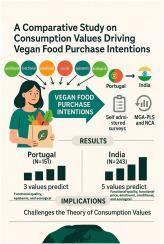Cultural contrasts in vegan food choice: A multi-methods comparative analysis of consumption values in Portugal and India
IF 3.6
2区 农林科学
Q2 FOOD SCIENCE & TECHNOLOGY
International Journal of Gastronomy and Food Science
Pub Date : 2025-09-23
DOI:10.1016/j.ijgfs.2025.101310
引用次数: 0
Abstract
This study examines the impact of consumption values on vegan food purchase intentions through a cross-cultural comparison between India and Portugal, two culturally distinct countries with divergent food traditions and value systems. Using the Theory of Consumption Values (TCV) as the framework, we analyze how functional, emotional, social, epistemic, conditional, and ecological values impact vegan purchasing decisions. We utilize both Partial Least Squares Multigroup Analysis (PLS-MGA) and Necessary Condition Analysis (NCA) on 394 responses collected via self-administered surveys.
Results show significant differences across countries: Indian consumers are primarily influenced by functional price, conditional, and emotional values, while Portuguese consumers tend to rely more on epistemic and functional quality. Notably, ecological value appears as a key predictor in both contexts. NCA results indicate that several values—particularly ecological, conditional, and functional price—are necessary (but not sufficient) for vegan food purchase intention. These findings challenge the TCV's assumption of additive and interchangeable value contributions, highlighting the importance of necessity-based reasoning in consumption choices.
This study contributes theoretically by expanding TCV with ecological value and methodologically by incorporating NCA. Practically, it provides actionable insights for marketers seeking to promote vegan consumption in culturally diverse markets.

素食选择的文化差异:葡萄牙和印度消费价值的多方法比较分析
本研究通过对印度和葡萄牙这两个具有不同饮食传统和价值体系的文化差异国家的跨文化比较,考察了消费价值观对纯素食品购买意愿的影响。使用消费价值理论(TCV)作为框架,我们分析功能,情感,社会,认知,条件和生态价值如何影响素食购买决策。我们利用偏最小二乘多群分析(PLS-MGA)和必要条件分析(NCA)对通过自我管理调查收集的394份回复进行了分析。结果显示各国之间存在显著差异:印度消费者主要受功能价格、条件价值和情感价值的影响,而葡萄牙消费者往往更依赖知识和功能质量。值得注意的是,在这两种情况下,生态价值似乎都是一个关键的预测因素。NCA结果表明,几个价值——特别是生态、条件和功能价格——对于纯素食品的购买意愿是必要的(但不是充分的)。这些发现挑战了TCV关于附加价值和可互换价值贡献的假设,突出了基于需求的推理在消费选择中的重要性。本研究的理论贡献在于以生态价值拓展TCV,方法贡献在于纳入NCA。实际上,它为寻求在多元文化市场中促进纯素消费的营销人员提供了可行的见解。
本文章由计算机程序翻译,如有差异,请以英文原文为准。
求助全文
约1分钟内获得全文
求助全文
来源期刊

International Journal of Gastronomy and Food Science
Social Sciences-Cultural Studies
CiteScore
5.30
自引率
10.50%
发文量
170
审稿时长
45 days
期刊介绍:
International Journal of Gastronomy and Food Science is a peer-reviewed journal that explicitly focuses on the interface of food science and gastronomy. Articles focusing only on food science will not be considered. This journal equally encourages both scientists and chefs to publish original scientific papers, review articles and original culinary works. We seek articles with clear evidence of this interaction. From a scientific perspective, this publication aims to become the home for research from the whole community of food science and gastronomy.
IJGFS explores all aspects related to the growing field of the interaction of gastronomy and food science, in areas such as food chemistry, food technology and culinary techniques, food microbiology, genetics, sensory science, neuroscience, psychology, culinary concepts, culinary trends, and gastronomic experience (all the elements that contribute to the appreciation and enjoyment of the meal. Also relevant is research on science-based educational programs in gastronomy, anthropology, gastronomic history and food sociology. All these areas of knowledge are crucial to gastronomy, as they contribute to a better understanding of this broad term and its practical implications for science and society.
 求助内容:
求助内容: 应助结果提醒方式:
应助结果提醒方式:


